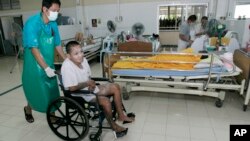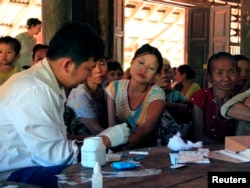The President of the World Medical Association said Thailand’s universal health program is a model for other emerging economies in Asia, including India, in providing health services to low income workers. There are growing tensions within the Thai health system amid pressures for co-payments to cope with rising costs.
Thailand’s universal health program, introduced in 2002, has been seen as a model for comprehensive health systems in Asia, especially in India and Myanmar, where the health systems are still evolving.
Universal health coverage
The coverage in 2002 quickly extended to 18 million people who were uninsured, along with an additional 29 million covered by less comprehensive schemes.
Michael Gideon Marmot, British public health professor in public health policy and president of the World Medical Association, said the Thai program stands in contrast to other health plans, such as those in India.
“With universal health coverage in Thailand, only about 20 percent of health care use is in the private sector –just over half of that is out of pocket – something like 11 [percent] of health care expenditure in Thailand is out of pocket,” Marmot explained. “In India, it’s 63 percent out of pocket – and pockets are shallow over in India. So Indians are being deprived of access to health care because they can’t afford it.”
Marmot said a higher proportion of India’s health system lies in the private sector, with few people covered by health insurance.
Thailand health care, a model for Asia
Marmot, in Thailand as a recipient of the Prince Mahidol award in Public Health, said Myanmar, under a new government led by the National League for Democracy (NLD), needs to focus on a health system backed by broad based development, as highlighted by a recent World Health Organization’s commission report.
“My advice [to Myanmar] would be to take the report of the WHO Commission and the social determinants of health and set up a mechanism – a cross government mechanism to ask the question – how we apply this to Myanmar – good quality early child development, education, employment, working conditions – making sure everyone has a minimum income,” stated Marmot.
Pros/cons in Thailand’s current system
But health activists in Thailand point to growing tensions within the health system and pressure within the bureaucracy to end the highly popular 30-baht (80 U.S. cents) co-payment program.
Recently the Thai Council of State, which provides advice to the executive branch, called for funds to be spent only on patient medical costs, excluding administrative and other expenditures.
The move has triggered widespread criticism from doctors and health activists, who say the funds are needed to assist in the running costs of public hospitals especially in rural areas.
Viroj Na Ranong, an economist with a private sector think tank, the Thailand Development Research Institute (TDRI) said the calls for reinterpretation points to policy conflicts within the health system.
“I think a lot people in the health services system try to abolish the 30 baht scheme, but they would never say it openly – they would say they want the scheme to go on but they want to improve it. But I think a lot of people actually want a major reform that will result in the patient having to pay a significant amount out of pocket,” he said.
But Viroj said there remains strong support in the community for the universal health care program. He said the government itself fears “chaos” in the health system if payments covered only patient care and pressure was made for higher patient co-payments especially focused on lower income groups.





